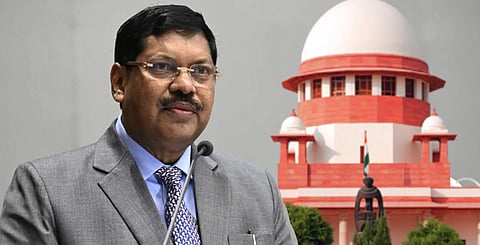
New Delhi- On May 13, 2025, Chief Justice of India Sanjiv Khanna will retire, paving the way for Justice Bhushan Ramkrishna Gavai to take over as the 52nd Chief Justice of India on May 14. Justice Gavai, the second Dalit and the first Buddhist to hold this esteemed position, is celebrated for his Ambedkarite ideology and humane approach.
Born on November 24, 1960, in Amravati, Maharashtra, Justice Gavai hails from a family deeply connected to Ambedkar’s ideals. His father, R.S. Gavai, was a prominent Ambedkarite leader, parliamentarian, and former governor of Bihar, Sikkim, and Kerala. Inspired by his father’s call to serve, Justice Gavai embraced the judiciary to realize Ambedkar’s dreams.
His legal journey is marked by diligence and excellence. After earning a BA, LLB from Nagpur University, he enrolled as an advocate on March 16, 1985. Mentored by Raja S. Bhonsale, former Advocate General of Maharashtra and Bombay High Court judge, he practiced independently at the Bombay High Court from 1987 to 1990. Post-1990, he focused on constitutional and administrative law at the Nagpur Bench. Elevated as an additional judge of the Bombay High Court on November 14, 2003, he became a permanent judge on November 12, 2005, and joined the Supreme Court on May 24, 2019. Now, he is poised to lead the judiciary.
He reveres the Constitution as ‘Bhim Smriti’, a tribute to Dr. B.R. Ambedkar’s vision of equality and liberation. His commitment to justice shone vividly in July 2023, when he left a cultural event to rush to the Supreme Court at midnight. The purpose was to protect social activist Teesta Setalvad from imminent arrest in a case linked to the 2002 Gujarat riots. Leading the bench, he questioned why Setalvad should be denied interim relief when even ordinary offenders receive it, underscoring his dedication to the rule of law and social justice
Justice Gavai’s humane outlook extends beyond the courtroom. He personally visited relief camps in Manipur to meet victims of ethnic conflict, listening to their grievances and instilling hope for justice. This reflects his Ambedkarite principles, rooted in social equality and upliftment of the marginalized.
In the courtroom, Justice Gavai commands respect with his authoritative yet empathetic presence. He listens patiently to arguments but firmly addresses breaches of decorum, with remarks like, “Then you pass the order,” restoring order swiftly. He encourages junior advocates and fiercely protects the rights of the underprivileged. His landmark judgments include cases on demonetization, Article 370, the Electoral Bond Scheme, and sub-classification within SC/STs.
His advocacy for introducing a ‘creamy layer’ within Scheduled Castes and Tribes, aimed at ensuring equitable justice, mirrors this commitment.
He granted relief to Congress leader Rahul Gandhi in a defamation case and imposed a symbolic one-rupee fine on advocate Prashant Bhushan in a contempt case. Solicitor General Tushar Mehta describes him as a blend of “intellect and innocence,” grounded in Indian jurisprudence and unswayed by utopian Western ideas.
Justice Gavai’s Ambedkarite ideology and humane perspective permeate his work. Vipin Nair, President of the Supreme Court Advocates on Record Association, believes his leadership will elevate constitutional values to new heights. A connoisseur of Marathi cuisine, he frequently visits Maharashtra Sadan in Delhi, and his sense of humor endears him to colleagues. Firm in his belief that public trust in the judiciary is the bedrock of democracy, he strives to make justice accessible to the most marginalized. As he assumes the role of CJI for a six-month term until November 23, 2025, Justice Gavai is set to leave an indelible mark on India’s judicial landscape.
You can also join our WhatsApp group to get premium and selected news of The Mooknayak on WhatsApp. Click here to join the WhatsApp group.